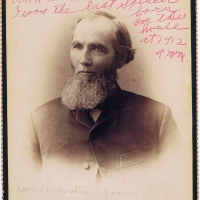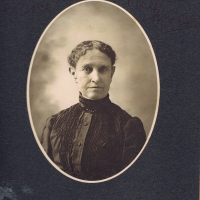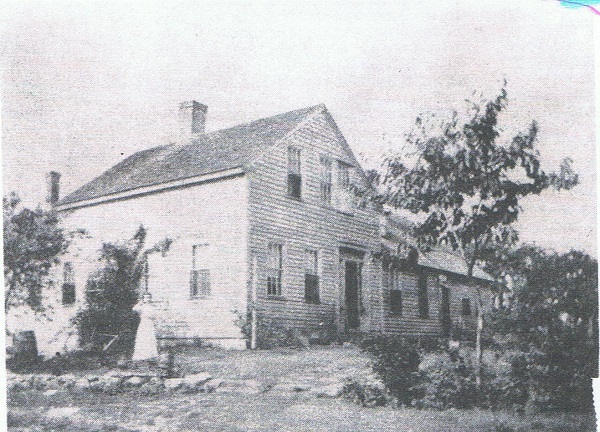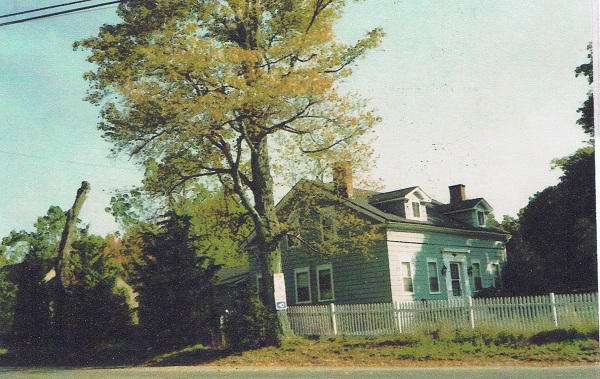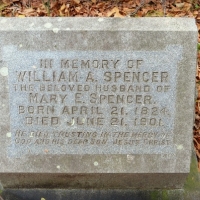 According to Audrey Mae’s artistically designed cemetery map and Audrey Mae’s gravestone numbering system in her Spencer Family Cemetery, William Augustus (“Gus”) Spencer’s gravestone is Gravestone Number Sixty-Four. Using her Smith-Corona typewriter in the late 1980s, Audrey Mae typed the following mini-biography of Augustus William (“Gus”), a seventh-generation Spencer in East Greenwich, Rhode Island.
According to Audrey Mae’s artistically designed cemetery map and Audrey Mae’s gravestone numbering system in her Spencer Family Cemetery, William Augustus (“Gus”) Spencer’s gravestone is Gravestone Number Sixty-Four. Using her Smith-Corona typewriter in the late 1980s, Audrey Mae typed the following mini-biography of Augustus William (“Gus”), a seventh-generation Spencer in East Greenwich, Rhode Island.

Bruce MacGunnigle – 34
Apparently, because Audrey Mae always heard William Augustus referred to as “Gus”, she thought his first name was Augustus as written in her mini-biography above. However, his gravestone and other sources have Augustus as a middle name and William as a first name. William is a common Spencer family name that has been in the family since 1330!
Augustus (“Gus”) William’s grandfather is the William Spencer who purchased the land in the eighteenth century and is buried in “over back” cemetery, the only cemetery on their land at that time (1777). “Over back” cemetery is thirteen hundred and eighty-three feet over the stone wall and to the back of the newer Spencer Family Cemetery (E.G. No. 9) on Middle Road in East Greenwich, R.I.
William Augustus (“Gus”) Spencer was born April 21, 1824 and died June 21, 1901. Photograph of “Gus” was taken at Norwich, Connecticut (USA) on May 1st, 1887. He was the fourth son of Roby (née Tarbox) and Richard Anthony (“Deacon”) Spencer and was married to Mary E. Harrington.
“Mrs. Mary E. (née Harrington) Spencer, wife of William Augustus Spencer, January 25, 1903. “This woman took our grandfather’s clock and high daddy chest that was never to leave the house,” said Audrey Mae (née Spencer) Mac Donald and also, wrote this on the back of Mary Spencer’s photo.
Nearly a century later, Audrey Mae was still talking about Mary E. (née Harrington) Spencer because “This woman took our grandfather clock and high daddy chest that was never to leave the house.” Apparently, these two pieces of furniture were always to stay within the Spencer family blood line’s possessions, and surely Mary (née Harrington) knew this. This was a time in America where a woman could be left destitute if her husband died before her and they had been living in his family’s house.
“Gus” was the great-uncle of William Joseph Briggs (aka J.B.) Spencer, Audrey Mae’s, John Edward’s and Edith Anna’s father. At age twelve, William J.B. Spencer was sent to live with his great-uncle’s family, William (“Gus”) and Mary (née Harrington) Spencer, and to work the land with his great-uncle. William J.B. was to inherit the land, as his great-uncle had no male heirs. With this agreement William J.B. was then disinherited from his own family of origin’s land, the land at Spencer’s Corner. This land was to be divided between his older and younger brother as William J.B. would eventually inherit his great-uncle’s land. William J. B. had to leave his parents, his older and younger brother, the family home and farm at Spencer’s Corner.
There was no love lost between great-uncle and the young nephew, and oral tradition portrays the great-uncle as a very mean man. (Web author’s thoughts: With fifty years difference in ages between great-uncle and grand-nephew, the miscommunications can be easily understood, especially before the days of family counseling. Unfortunately, inheriting farm land in the 1890s would not mean much to a twelve year old boy, especially since his own family of origin had plenty of land. Also, his great-aunt and great-uncle were fifty years older than he. Apparently, he was chosen because he was the middle son or maybe because he had the same first and last name as the uncle.)
The fact that “the beloved husband” is carved on his gravestone lets the reader know there was more character to this great-uncle than the descriptive adjective “mean” by the young grand-nephew. However, in 2001 the web editor was interviewing Audrey Mae when she again retold the tale of “Gus was mean” and Audrey Mae also added, “When Edith (Edith Anna, Audrey Mae’s older sister) was three years old, Gus died.”
Having male heirs meant everything in the English tradition as far as land and money were concerned. That tradition gives Spencers a sense of pride as well as tragedy and even comedy as descendants over a hundred years later still refer to great-uncle “Gus” as a mean man. Only after doing this research into Audrey Mae’s work did this web site author realize the burden as well as the privilege of land ownership. In the British series, Downton Abbey, the Earl of Grantham explains that he is “a caretaker”; he is “not an owner”. Audrey Mae’s, Edith Anna’s and John Edward’s father’s, William Joseph Briggs (aka J.B.) Spencer’s, idyllic life as a young boy was changed instantaneously because of this tradition. He was taken from his own family and put in the “clutches” of another Spencer family.
Another tradition followed by the Spencers was a boy becomes a man at age twelve. What a price to pay for William J.B. Spencer on turning twelve years old. Besides, the nineteenth century was ending and there was change in the air. Outdated traditions were breaking down and some for the better. (The web site author hears the verse of Topol’s singing “Tradition” in the movie, Fiddler on the Roof, with a new and deeper understanding. Tradition is powerful.)
The straightspencerhistoricalcemetery.org gives us the following information on William Augustus (“Gus”) and Mary E. (née Harrington) Spencer and the Spencer farm land on Middle Road in East Greenwich, Rhode Island. William Augustus and Mary (née Harrington) Spencer’s family farm was on the south side of Middle Road in the current Partridge Run area of East Greenwich, Rhode Island.
Until age twelve, their grand-nephew,William Joseph Briggs (aka J.B. ) Spencer, lived with his family on the Spencer farm at Spencer’s Corner on Division Road. Spencer’s corner is at the current area of the intersection of Crompton, Shippeetown and Division Roads.
In contrast the first Spencer’s land in East Greenwich in the seventeenth century was approximately five miles east by Sunset Rock, a location description used by the early colonials. See spencersofeastgreenwichri.org.
Web site author does not know if there is any significance to Delilah’s (gravestone No. 63) burial not being in the row with her siblings (gravestones 16-22) or why she and her husband, Pallemen A. Whipple, Jr. are buried in the northwest corner section, next to “Gus” (gravestone No. 65). William Augustus (“Gus”) is Delilah’s father’s brother’s son. Gus is the son of Roby (née Tarbox) and Richard Anthony (“Deacon”) Spencer’s son. Therefore, Gus and Delilah are first cousins. (Web site author’s reflection: If “Gus” was so mean, why would Delilah and her husband be buried by him? Family dynamics are baffling at times, but it makes for fun stories decades and centuries later. No wonder we are told to study history so we can learn from the past.
To this day, when some aware younger descendents of William Joseph Briggs (aka J.B.) Spencer walk by his great-uncle’s gravestone, they lightly kick it. On admonition from an older person, the young person’s response was “Well, Grandma did it”. Also, to this day a descendant of William Joseph Briggs (aka J.B.) Spencer does not mow the grass or pull the weeds around “mean” uncle Gus’s gravestone. That descendent, age 63, on reading this web page said “so that is why I never mow or care for that walled off northwest corner section within the cemetery. That is where William J.B.’s mean uncle is buried! As a kid I was taught to leave that higher elevation section alone. As an adult I often wondered why, but yet I never mowed the grass or pulled weeds in that small corner of the graveyard. My earliest recollection of mowing lawns and landscaping was the historic family cemetery. That was the first time I learned how to use a lawn mower…” (Author’s note: If descendants of historical cemeteries — or any descendants of America or new Americans — want their young children to revere the historical cemeteries then take heed! Bring your young child – male and female!- to the cemetery to “teach” them how to care for land. At that age, that is fun! The seeds were planted in the 63 year old man’s childhood for him to become a caretaker for his historical cemetery. Seeds are planted in our childhood and “an apple doesn’t fall far from the tree”. “We are all standing on the shoulders of the people who came before us.”) We can learn much from them.
“Spencer,Johnson, Goff, Tarbox and Harrington descendants, if you have any additional information on William Augustas (“Gus”) Spencer, please add a comment to this web site and the web site editor will add this to the site. Thanks!”

